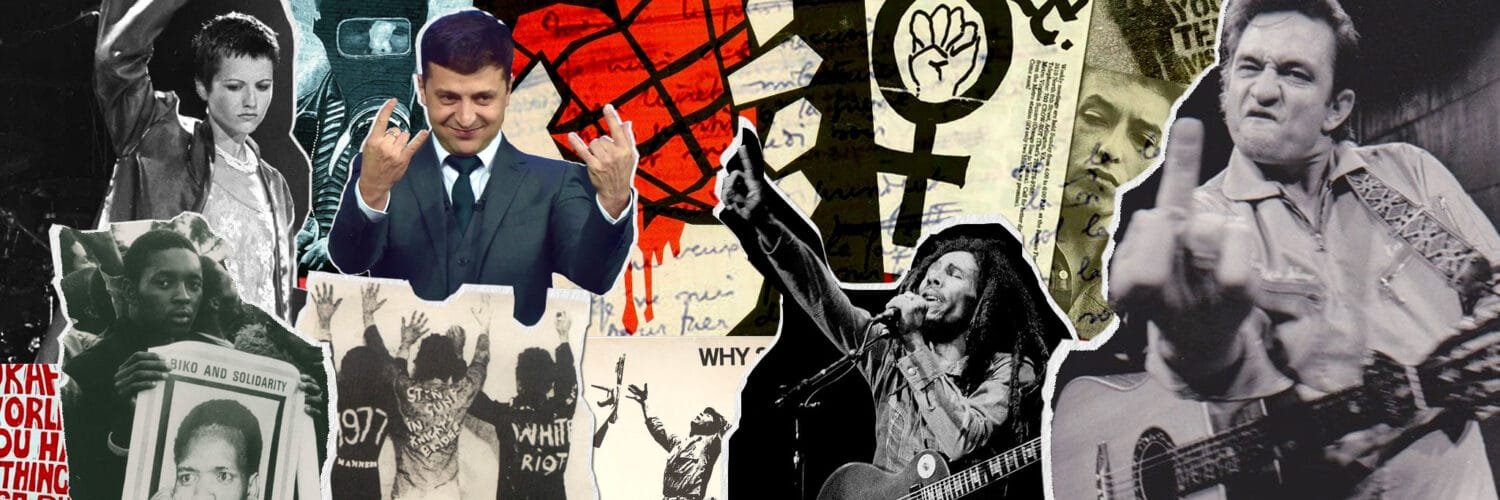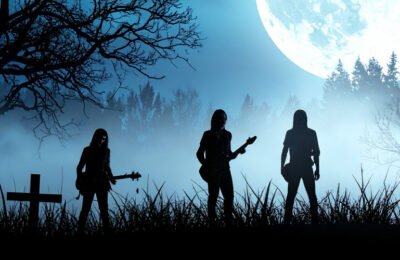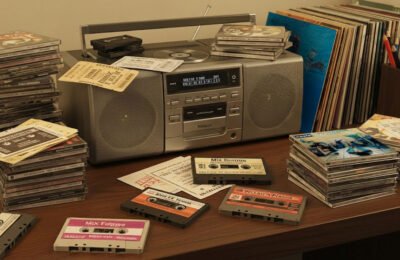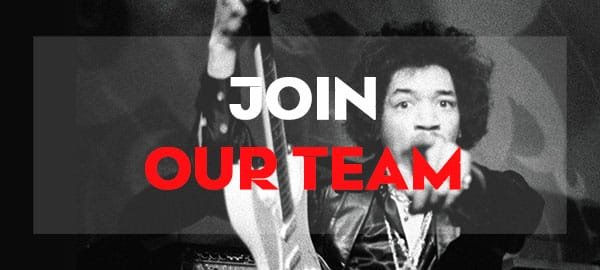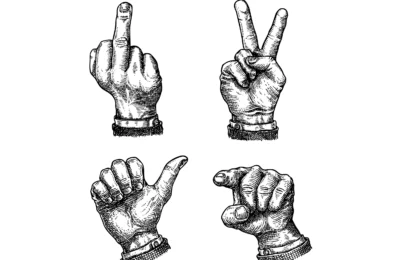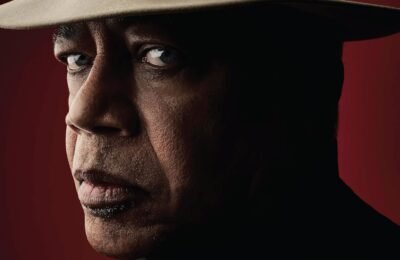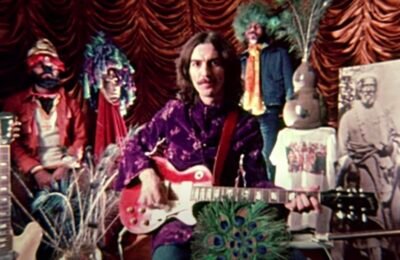In these days of political uncertainty, music has always played a powerful role in amplifying voices and sparking action. Protest songs have long been anthems of resistance, courage, and unity, transcending borders and generations. We asked our readers to help us come up with a protest songs playlist. We mixed their suggestions to our selection. Here’s the result—an unapologetic celebration of protest through song.
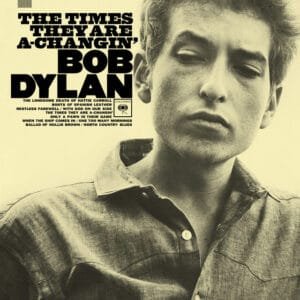
The Times They Are A’ Changing, by Bob Dylan
How better start this playlist but with this ultimate protest song? Bob Dylan wrote the song as an anthem of change for the moment. A month after recording it, President John F. Kennedy was shot. The very next day, Dylan opened his concert with his new song. He feared a violent reaction, but he felt as he had to. The audience loved it, to his biggest surprise. « I couldn’t understand why they were clapping, or why I wrote the song. I couldn’t understand anything. For me, it was just insane »
Some might think that the song had been made obsolete by the very changes that it predicted soon after it was written. I couldn’t disagree more. Listening to it today, the song is still carrying the same strong and meaningful message. Change is still happening, and not for the better.
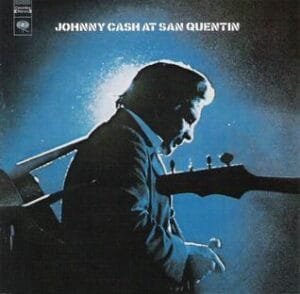
San Quentin, by Johnny Cash
San Quentin, released in 1969, is a bold, defiant anthem. Johnny Cash performed it live at San Quentin State Prison, singing directly to the inmates. The song attacks the prison system with raw anger. Lines like “San Quentin, may you rot and burn in hell” make it brutally direct. Cash wasn’t a traditional activist, but he stood with society’s outcasts. His words echo the frustration of those trapped in a broken system. The song’s energy is fierce, almost punk-like. It’s a powerful protest against injustice and institutional cruelty.
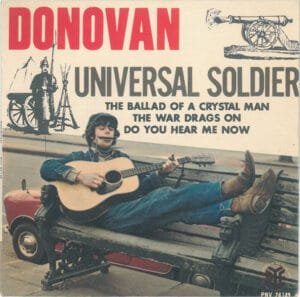
Universal Solider, by Donovan
The song was initially written by Buffy Sainte-Marie, released by The Highwaymen in September 1963, and ultimately on her own debut album in April 1964. The song met a mild success among folk music enthusiasts, but really met popular success with Donovan’s cover in 1965. The Universal Soldier, is maybe the ultimate anti-war song. It is about individual responsibility: without any soldier there would be no war. Which brings us to our next song…

Le Déserteur, by Boris Vian
The song, written by French poet and musician Boris Vian, is a letter written by a soldier to his president. He lets him know that he refuses to leave for the battle field, to kill people. He tells him how war already had a claim a toll on his family. The soldier decides to be a deserter, and invites his president to go fight his war himself. He also let the leader know, that he can send his gendarmes after the deserter. They are free to shoot him as he will be unarmed.
The song, first recorded by Marcel Mouloudji in 1954, and by Vian himself in 1955, was banned by the French National Radio Committee, for anti patriotism. In 1958 it was further banned from radio and sale, leading to the song being passed on in clandestinity. It is only in 1962, after the Algerian war, that the ban was lifted.
Le Déserteur went beyond borders and was translated and recorded in many languages: Esperanto, German, English, Italian, Spanish and many others… Joan Baez also sang the song (in French). It was also re-invented by Renaud in 1983.
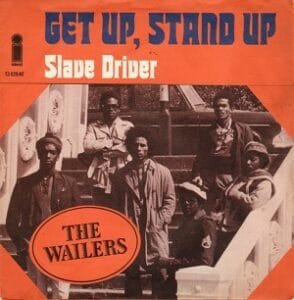
Get up, Stand Up, by The Wailers
Bob Marley and Peter Tosh wrote together, and it was released in 1973 on The Wailers’ album Burnin’. The inspiration for this song came as the band was touring in Haiti. Marley was deeply moved by the extreme poverty and lives of Haitians. The chorus is directly inspired by Slippin’ Into Darkness released in 1971 by War — a band Marley admired.
The song is call for action, inviting people to rise and act for their own rights, in order to achieve peace in this life rather than wait for peace in the afterlife. This anthem was often performed as the last song in Bob Marley’s live performance… It is actually the last song he ever performed on stage.
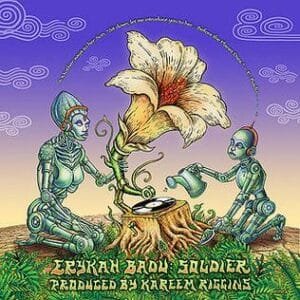
Soldier, by Erykah Badu
suggested by Stephen O’M.
Soldier, was released in 2008, on Erykah Badu‘s album New Amerykah Part One (4th World War). It stands as a powerful, unapologetic anthem for resistance and resilience in the face of systemic oppression. Soldier fits into the tradition of protest music using art to confront injustice, rally the disenfranchised, and expose uncomfortable truths. Following Marvin Gaye’s What’s Going On or Nina Simone’s Mississippi Goddam, Badu makes her mark with her unique neo-soul and hip-hop-infused lens on the early 21st century.
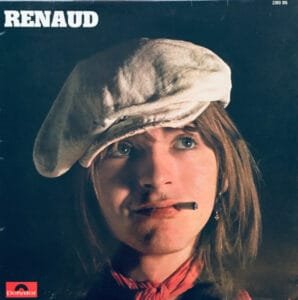
Hexagone, by Renaud
Renaud is a French singer who lived up to be known as ‘the annoying singer’ because he had the knack on getting on people’s nerves with his lyrics. Since he started his career as a singer songwriter, he made point in using his music to disturb the ‘peace’. Some said he was doing Verlaine’s job using street talk.
In 1975, on his debut album, he wrote Hexagone, a song depicting the lives of French people month by month. He exposes very sarcastically their outdated traditions, and multiple contradictions. The song was so annoying that some radio refused to broadcast it. Fifty years later, the song still resonates.
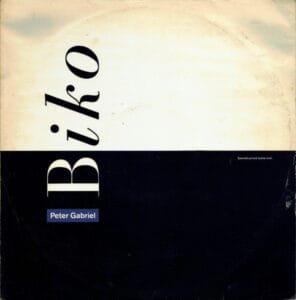
Biko, by Peter Gabriel
suggested by Liam B.
One of the defining songs of Peter Gabriel’s long and esteemed career, “Biko” was written in the aftermath of the death of its namesake, Steve Biko, in 1977. Already dabbling in African music influences, Gabriel was deeply affected upon hearing of Biko being beaten to death by policemen in South Africa.
One part eulogy and two parts rallying cry, Gabriel spent a year refining the lyrics to adequately capture his outrage at the injustices and suffering experienced by the people living under apartheid. The result was worth the time taken. Biko became one of the ani-apartheid movement most defining songs, bringing new awareness of the apartheid, and of Biko himself, to the world.
Gabriel has since remained involved in humanitarian causes and in the promotion of world music. And while the era of apartheid in South Africa may be long over, “Biko” has stayed within the public consciousness. To this day, Gabriel still closes out live concerts with this song as the final encore, one of his most enduring and impactful masterpieces.
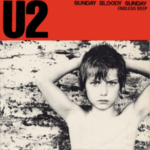
Sunday Bloody Sunday, by U2
Released in 1983, Sunday Bloody Sunday is one of the most powerful protest songs ever written. With its opening militaristic drumbeat and The Edge’s signature guitar sound, it is also one of U2’s most iconic tracks. While the title refers to the Bloody Sunday events of 1972 in Derry, the lyrics go beyond that, addressing how any conflict can shatter lives and families in an instant—often for no clear purpose.
The song, often mistaken for a rebel anthem, led Bono to make a passionate speech during a concert in Denver on November 8, 1987—the same day as the Remembrance Day bombing in Enniskillen. Tired of hearing Irish Americans, who never set foot back to Ireland, talking about “glory of revolution”, he declared:
“Fuck the revolution! They don’t talk about the glory of killing for the revolution. What’s the glory in taking a man from his bed and gunning him down in front of his wife and children? Where’s the glory in that? Where’s the glory in bombing a Remembrance Day parade of old-age pensioners, their medals taken out and polished up for the day? Where’s the glory in that? To leave them dying or crippled for life or dead under the rubble of a revolution that the majority of the people in my country don’t want. No more!”
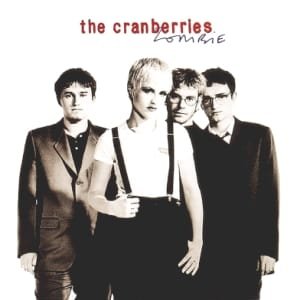
Zombie, by The Cranberries
In 1993, the Cranberries were on tour in the UK when the IRA planted two improvised bombs in rubbish bins in a shopping street of Warrington. The explosion took the life of two children aged 3 and 12, while injuring 56 other persons. Dolores O’Riordan was devastated by the news of the event, being so close to the location that day. “A child is slowly taken” is a direct reference to the loss of these two young boys. More than just a hit song, Zombie became an anthem against war and terrorism, resonating far beyond its original context.
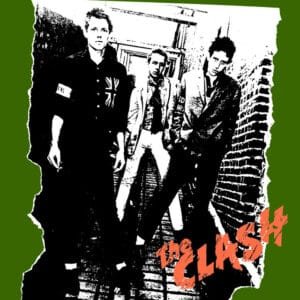
I’m So Bored By the USA, by The Clash
Initally, Mick Jones had wote the song in reference to his ex-girlfriend . When he played it to Joe Strummer however, the singer misheard the lyrics in the chorus. “I’m so bored with you” became “I’m so bored with the USA”. The pair re-arranged the lyrics and it became the anthem we all know.
The song expresses frustration with American culture and its influence on the world. Released in 1977, it criticizes consumerism, political apathy, and the way American values are spread globally. The song captures the anger and disillusionment felt by many. Its raw energy and simple, direct message is a reminder to not accept things as they are and to push back against what feels wrong.
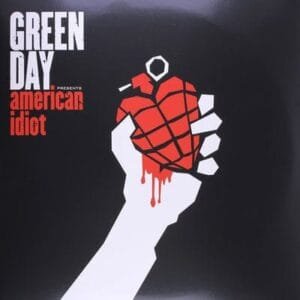
American Idiot, by Green Day
American Idiot was written in 2004 in reaction to overwhelming media coverage during George W Bush presidency, leading to paranoia and idiocy in the public. Billie Joe Armstrong thought back then that the media was crossing the line between news coverage and reality-tv too easily. This track came to be Green Day’s first into the Billboard Hot 100 in 2004, but also #1 in Canada, and their first top 5 in UK.
“Thanks” to Donald Trump, the song knows a new life. A campaign was launched in 2018, prior to President Trump’s visit to UK, to bring back the hit into he charts. The song came back #25 on UK singles charts. Also, the band likes to revisit the lyrics to fit current events while they perform live. During Trump’s first run for office, they changed the line “the subliminal, mind-fuck America” to “the subliminal mind-Trump America”. In 2019 they updated “I’m not a part of a redneck agenda” into “I’m not a part of the MAGA agenda”.
This last change was met with Elon Musk’s disapproval in a tweet: “Green Day goes from raging against the machine to milquetoastedly raging for it.”. Earlier this year, the night before President Trump’s inauguration, the band was performing in Johannesburg. Green Day took the opportunity to take a jab at Musk in own country and changed this line again to “I’m not a part of Elon’s agenda”.
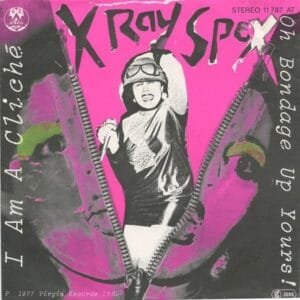
Oh Bondage Up Yours!, by X-Ray Spex
Released in 1977, the song is a fierce critique of oppression in all its forms. Poly Styrene opens with this innocent line, “Some people think little girls should be seen and not heard…”, before erupting into a defiant scream of “Oh bondage, up yours!”. The track is both feminist and anti-establishment in its message. With its frantic energy, jagged saxophone, and Styrene’s unrelenting vocals, Oh Bondage Up Yours! is a battle cry for freedom and individuality.
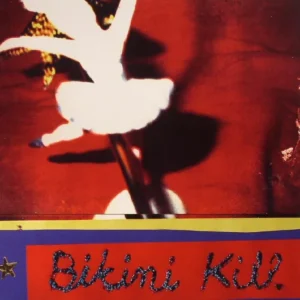
Rebel Girl, by Bikini Kill
suggested by Ella D.
Bikini Kill’s Rebel Girl is a fierce feminist anthem that ignites the spirit of rebellion and empowerment. Released in 1993, the song became a rallying cry for the Riot Grrrl movement, championing female solidarity and resistance against patriarchy. With Kathleen Hanna’s raw, urgent vocals and gritty punk instrumentation, Rebel Girl celebrates the power of women who defy societal expectations and inspire others to do the same. Lines like “That girl thinks she’s the queen of the neighborhood, I got news for you—she is!” turn admiration into revolution, making it a song of both defiance and admiration. More than just a punk classic, Rebel Girl remains an essential protest song, fueling feminist activism and DIY punk spirit for generations.
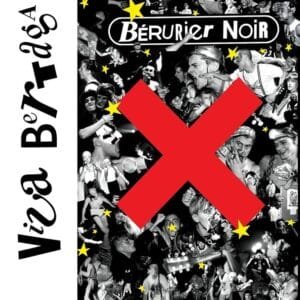
Porcherie, by Bérurier Noir
suggested by Paul A.
Bérurier Noir’s Porcherie is a raw and furious punk French anthem that perfectly encapsulates the band’s anarcho-punk brand. Released in 1985, the track is an unfiltered critique of authoritarianism, police brutality, and societal decay. With its pounding drum machine, distorted guitar riffs, and shouted vocals, Porcherie channels pure punk energy into a call for resistance against oppression.
The song was written in 1984 in reaction to the Front National making a historical high-score for a national election with 11% of votes — sadly this score has doubled by now. On the studio version, we can hear a speech by Jean-Marie Lepen, leader of the far-right party, followed by fitting squeals of a pig —“porcherie” meaning “pigsty”. The live version (released in 1990) ends with the audience chanting “La jeunesse emmerde le Front National”. This chant is now the anthem of any anti-fascist protest in France.
